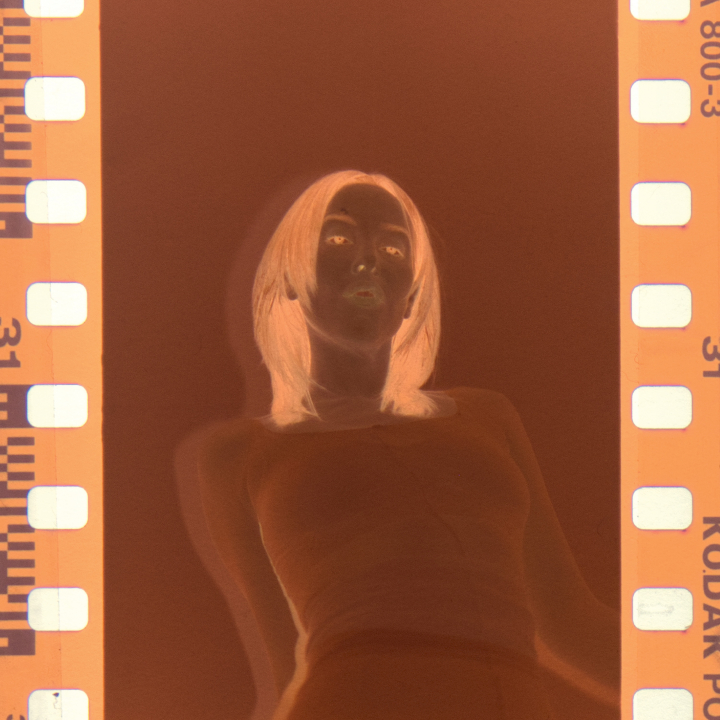Debit returns to Modern Love with her second album for the label, a chopped & screwed love-letter to the sounds of rebajada - half speed cumbia pioneered by Sonido Dueñez - sounding like some incredible crossover between DJ screw and The Caretaker doing vaporwave in Colombia's Caribbean coast.
Spend any amount of time pacing the streets of Monterrey, the bustling city in the north of Mexico where Delia Beatriz, aka Debit, grew up, and you'll be sure to catch traces of cumbia echoing from Bluetooth speakers, DIY soundsystems or car stereos. An Afro-Latin dance form and "practica cultural" originating in Colombia in the early 19th century, cumbia evolved rapidly in the early 1900s, as a localised sound played on drums and flutes quickly modernised to integrate European instrumentation like the accordion. When it reached Mexico in the 1940s, the sound shifted again, fusing with mariachi styles and integrating further vallenato folk elements. Eventually, cumbia spread across the entirety of Latin America, splintering into a spectrum of different musical styles such as chicha in Peru and cumbia villera in Argentina. And over in Monterrey, cumbia inadvertently found its own idiosyncratic groove.
In the 1950s until the 1970s, waves of immigrants from across Mexico and Latin America headed to Monterrey to find work, making a home in Colonia Independencia. And Colombian cumbia records, shipped in from Mexico City, Houston and Miami, became the soundtrack of the neighborhood, relaying familiar stories to a rural working class adjusting to their new industrial reality. The sound struck a chord with locals, and huge street parties hosted by ramshackle soundsystems known as sonideros unified the diverse community. So when cumbia rebajada materialized serendipitously in the 1990s, it emphasised and highlighted the memory distortions at the heart of the immigrant experience. Local record collector, selector and sonidero Gabriel Dueñez had been playing cumbia for hours one night when disaster struck: his turntable's motor overheated and slowed down turning the music into a warped groan, with half-speed voices echoing over wobbly accordion drones and splashy drums. But the crowd kept dancing, and Sonido Dueñez realized he'd struck gold - cumbia rebajada was born.
Over the next few years he dubbed a popular series of mixtapes, hawking them at the flea market on the dried-up Santa Catarina riverbed beneath El Puente del papa, the bridge that links downtown Monterrey with Independencia. And these woozy archives became the stuff of legend, poetically but subconsciously shadowing DJ Screw's series of epochal cassettes that appeared over the border in Houston. Beatriz uses Sonido Dueñez's first two tapes as the starting point for 'Desaceleradas', entering into a dialogue with time, culture and geography as she recalls the sonic ecosystem that surrounded her decades ago, long before she emigrated to the USA. If 2022's acclaimed 'The Long Count' was an attempt to recover concealed pre-Columbian history in the face of colonisation, 'Desaceleradas' jumps forward, figuring out how memory and shared celebration can resist a more contemporary form of cultural erasure.
It's a way to embrace slowness as emotionless algorithms accelerate capitalism and a reminder that memory itself is a long, resonant dialog with the past that changes as it's passed from person to person. In Beatriz's hands, Sonido Dueñez's cumbia rebejada is sculpted into a symphony of psychedelic breaths and dreamy gestures as the tapes are re-voiced with her ARP 2600 synthesizer and re-played on her mother's accordion before being pulverised by her careful granular processes. "The goal was not to sample," she explains, "but to engage in conversation." And from track to track, the slowed down sonics, that follow the lead of scratchy sun-baked wax dragged across cheap hi-fi needles and stretched tape winding over busted heads, make salient connections to electronic music's tangled web of subgenres, from dub reggae in Jamaica to vaporwave and its TikTok-friendly "slowed + reverb" progeny.
On 'La ronda y el sonidero', cumbia's familiar syncopated 2/4 shuffle is ground down until its street corner sway becomes a cloud of ruptures and distortions that surrounds Beatriz's melancholy synth moans. She pays respect to Monterrey's tape culture on 'bootlegs', introducing her impressionistic harmonies with vinyl crackle, and gives a nod to Monterrey's Cholombianos - groups of cumbia fans who dressed in brightly coloured baggy clothes, slathering their long sideburns with gel - on the wistful 'Cholombia, MTY'. By harnessing her memories and casting Sonido Dueñez's legacy in amber, Beatriz provides a space for listeners to hear history itself: to wander down 'El Puente del papa' and breathe in the atmosphere of Monterrey.
As AI systems scrape, blend and decontextualise culture around us, leaving vapid slop, 'Desaceleradas' proposes a slower, more careful, and ultimately more human kind of engagement. It's an archive with a pulse.












